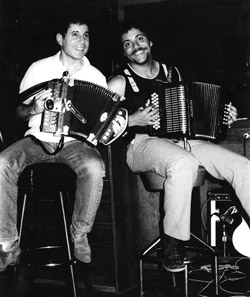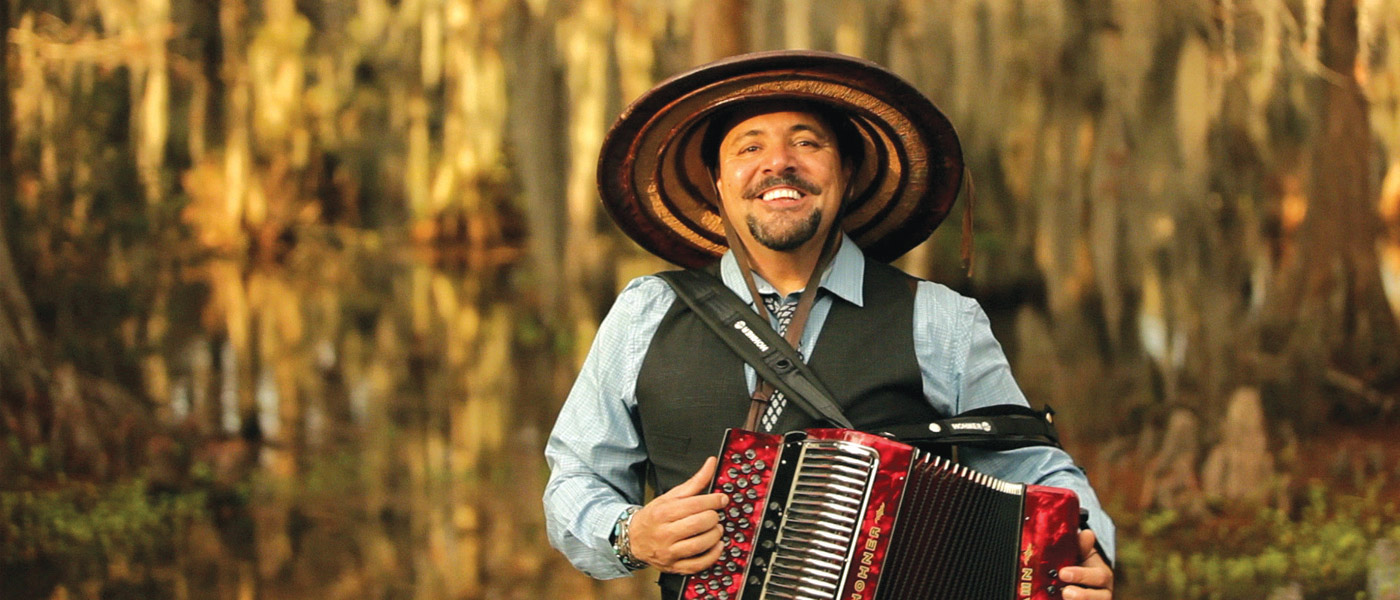There’s a lot to be said for perspective. And, for Terrance Simien, the last year has offered it in spades. The Mallet native has plied his trade for decades, playing his particular flavor of zydeco to fans across the globe. The band was the first to showcase zydeco in a major motion picture, 1986’s “The Big Easy.” Simien even made an appearance on a Disney soundtrack, 2009’s “The Princess and the Frog,” playing accordion, rubboard and triangle on “Gonna Take You There,” his collaboration with Randy Newman.
“I’ve been very fortunate to have certain things happen,” Simien said. “We got the first zydeco song in a Disney film. Then the Grammy in the zydeco music category, and then a second Grammy in a different category. In the last year, I had time to look back at all that we were able to accomplish. It’s very humbling.”
 At this point in his career, Simien performs internationally, mostly at performing arts centers and festivals, and also at schools, where he introduces students to zydeco music and Louisiana’s Creole culture through his Creole For Kids educational program.
At this point in his career, Simien performs internationally, mostly at performing arts centers and festivals, and also at schools, where he introduces students to zydeco music and Louisiana’s Creole culture through his Creole For Kids educational program.
“We play very, very few clubs,” he said.
But that made the pandemic’s effects even more severe. Simien’s typical venues have largely been shuttered during the last year. “Especially theaters and art centers,” Simien said. “I think those are going to be last to come back, but we are starting to book gigs for the fall.”
Simien has spent the last 35 years on the road, ever since a recording he made for Paul Simon’s “Graceland” ended up on the cutting room floor. It may not have made the record, but the four-part harmonies and professional production made for a great single — and a very slick demo.
People who think the music should never change don’t understand what music really is. I say, ‘If you want to be a traditionalist, go pick up an accordion and make the music you think should be made.’ If you can’t do that, then sit down.
Simien said he had never spent more than two months in Louisiana in one stretch since then, until the COVID-19 pandemic put live music on life support.
“There was good and bad with that,” he said. “The good part was that I was able to be with my wife and family for a whole year. When you go, go, go like that, you don’t realize the strain you’re putting on your body. So, this was a time of relaxation and a time of creativity. I was in the studio every day and this time has really been a good time.”
To say he has been prolific during the forced touring break would be a gross understatement. The respite gave him a chance to collaborate with fellow nouveau zydeco stalwart Keith Frank and New Orleans brass scion Glen David Andrews to record “Ancestral Grooves,” a digital album released last August, credited to Terrance Simien’s Krewe de Monifique.
The project got its start before the pandemic took hold when Simien and Andrews played the New Orleans Jazz and Heritage Foundation’s annual gala in April, 2019. The combination of New Orleans funk and jazz with Simien’s bluesy zydeco got Andrews excited.
“He grabbed me and said, ‘We need to do a record!’” Simien recounted in his best impression of Andrews’ raspy voice. “‘Man, we need to do a record!’ So, I started working on the project.”
The album’s nine tracks were recorded from February to June of 2020 in studios in five states, including Louisiana’s Race Street Studio in New Orleans and Dockside Studio in Maurice.
Also during that time Simien’s wife, Cynthia, was speaking with the curators of the National Museum of African American Music about why there was no zydeco representation planned for the museum, which opened in January.
Now, one of Simien’s signature West African Fulani hats is part of an exhibit at the Nashville site, along with Queen Ida’s Hohner accordion and a rubboard belonging to Reggie Dural, son of the late Stanley “Buckwheat Zydeco” Dural Jr. The artifacts are accompanied by a handmade Creole flag.
Most recently, in April, Simien was one of 32 Louisianians to receive an inaugural World Maker Award and a grant from the Foundation for Louisiana. More than 360 artists, cultural workers and tradition bearers competed for the honor, which supports creative, visionary work across the state.
“We are working on some things,” Simien said slyly. “I can’t give anything away. But we have some things coming.”
Along with the pandemic-induced productivity for Simien also came some introspection and time to evaluate the state of zydeco music.
“People who think the music should never change don’t understand what music really is,” Simien said. “I say, ‘If you want to be a traditionalist, go pick up an accordion and make the music you think should be made.’ If you can’t do that, then sit down.
“And don’t write about it,” he continued. “There are a lot of people who have things to say who really don’t know nothin’ about nothin’. People come out of nowhere and try to write our history. And when the people who live it tell the truth about it, well, sometimes people just don’t believe it.”
The demands of purists send a confusing message to young musicians, said Simien.
“It’s Important that artists don’t let anyone talk them out of being artists,” he said. “There’s a new generation of artists trying to figure it all out. They should take ownership of their music.
“The music changed -- from juré to Amédé to Clifton to the artists of today,” Simien concluded. “And if it’s not changing, it’s dying.”

